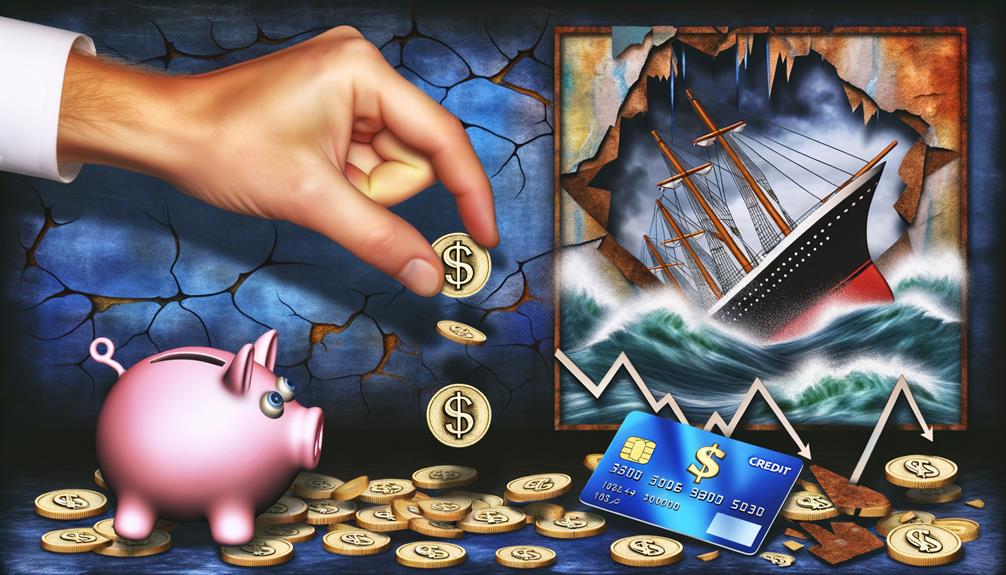Top 10 Most Common Financial Mistakes
So, you think you’ve got your finances all figured out, do you? Think again. It’s easy to overlook the small stuff that can eventually pile up into a substantial financial burden.
From the daily latte habit that quietly drains your wallet to the shiny new car that depreciates the minute you drive it off the lot, common financial mistakes can be deceptive.
But don’t worry, there’s more to learn. Are you ready to dig into the top 10 most common financial blunders, some of which you might be making right now?
The Trap of Frivolous Spending
Watch out for the trap of frivolous spending, as it can quickly drain your resources on unnecessary purchases and significantly affect your financial stability. It’s surprisingly easy to fall into this pitfall, especially when you’re not keeping a close eye on your finances. Those small expenses, like daily lattes or frequent take-outs, might seem insignificant at first. But over time, they accumulate and can put a serious strain on your budget.
Dining out and entertainment costs, while enjoyable, can add up quickly and lead to financial strain. It’s not about completely depriving yourself of these pleasures, but rather, striking a balance. You’ve got to be mindful of your non-essential spending and consider whether each purchase is truly worth it.
Cutting back on such non-essential items is a crucial step towards improving your financial health. This doesn’t mean you have to live a life of austerity, but it does require a certain level of discipline and a commitment to making smarter financial choices. By avoiding frivolous spending, you’re not only preserving your current resources but also safeguarding your long-term financial survival and security.
Dangers of Continuous Payments
You mightn’t realize it, but continuous payments for subscriptions and memberships can sneakily lead to significant overspending, especially if they’re for services you hardly use or don’t use at all. It’s easy to forget about that magazine subscription you signed up for a year ago or that gym membership you haven’t used in months. However, these forgotten subscriptions can quickly drain your savings.
Recurring payments might seem small and insignificant when you sign up for them, but they can accumulate into substantial annual expenses. When you multiply the monthly cost by twelve, it’s clear that these payments can eat away at your wallet. In fact, many Americans spend an average of $640 per year on unused memberships.
Risks of Living on Borrowed Money
Just as continuous payments can silently erode your savings, living on borrowed money presents its own set of financial pitfalls. You may find yourself in a never-ending cycle of credit card debt. Relying on plastic for daily expenses can result in interest piling up, leading to steep repayment costs. It’s a dangerous habit that can swiftly usher in financial instability.
Borrowing beyond your means not only strains your budget but can also put your long-term financial goals and savings at risk. Those tempting credit card purchases or loans can turn into a mountain of high-interest debt that’s hard to climb out of.
What’s more, living on borrowed money can negatively impact your credit scores. High credit card balances can send your scores plummeting downwards, making it difficult for you to secure loans or credit in the future.
In essence, living on borrowed money is like walking a financial tightrope. It’s a risky and precarious balance that can lead to severe financial distress. The high repayment costs, constant interest accumulation, and potential damage to your credit scores make it a financial mistake to avoid.
Consequences of Buying a New Car
Diving into a decision to buy a new car might seem like a great idea, but it’s essential to consider the considerable financial consequences that can come with it. New cars are depreciating assets, meaning they lose value the moment you drive them off the lot. In fact, a new car depreciates by about 20-30% in the first year, leading to an immediate financial loss.
Moreover, owning a new car often leads to higher insurance costs. Insurers usually charge more to cover new cars because they’re worth more than used cars. Additionally, buying a new car also involves financing. You might end up paying higher interest rates compared to financing a used vehicle, which can be a significant financial burden.
Lastly, don’t overlook the registration fees. New cars typically require higher registration fees and taxes.
Here’s a quick rundown:
| Consequence | Explanation |
|---|---|
| Depreciating Asset | Loses 20-30% value in the first year |
| Higher Insurance Costs | New cars are worth more, hence more expensive to insure |
| Financing and Registration Fees | Higher interest rates and registration fees |
Weigh your options carefully before making a decision.
Overspending on Housing
Much like the financial implications of buying a new car, overspending on housing can also lead to significant financial strain. Whether it’s allocating more than 30% of your income to rent or mortgage payments, or getting wrapped up in the appeal of an oversized home with unnecessary features, you’re risking your financial stability.
Remember, high housing costs don’t just strain your monthly budget; they can also limit your ability to save money for other financial goals. It’s easy to overlook the way housing costs can seep into other areas of your life, such as higher maintenance and utility expenses.
You must understand the different types of credit available for housing and make careful decisions to avoid overspending. Don’t let the appeal of a bigger, fancier home lure you into a precarious financial situation. Prioritize affordable housing options that align with your income and long-term financial health.
In the end, avoiding overspending on housing isn’t just about saving money. It’s about maintaining financial stability, giving yourself the flexibility to meet unexpected expenses, and securing a strong financial future.
Misusing Home Equity
Turning to your home equity for non-essential expenses or without weighing the long-term implications can set you back financially in ways you may not foresee. It’s tempting to use this significant financial resource for immediate needs or wants, but there are potential pitfalls to be aware of.
- Misusing your home equity can lead to unnecessary interest payments, adding up over time. You’re essentially paying more for your purchases in the long run.
- You may end up sacrificing ownership of your largest asset – your home. If you can’t keep up with the repayments, you risk foreclosure.
- It can result in financial burdens that affect your long-term financial stability. This could impact your ability to retire comfortably or fund your children’s education.
- Refinancing without a clear understanding of the terms might mean higher costs down the line.
Before tapping into your home equity, it’s crucial to consider these risks. Use it wisely, for expenses that will improve your financial situation in the future, like education or home improvements. Misusing home equity can lead to long-term problems, so plan wisely to maintain your financial stability.
Perils of Living Paycheck to Paycheck
In a financial tightrope act, you might find yourself living paycheck to paycheck, a precarious situation faced by 78% of U.S. workers struggling to make ends meet. This lifestyle puts you in a state of constant financial vulnerability, with a lack of savings leaving you ill-equipped to handle unexpected expenses. In fact, 40% of Americans can’t cover a $400 emergency expense.
Ever-reliant on your next paycheck, you’re stuck in a cycle of financial instability. A sudden car repair or medical bill could cause a monetary derailment you’re not prepared for. Without savings, you’re always on the brink, without any safety net to catch you.
Breaking free from living paycheck to paycheck is no easy task, but it’s not impossible. It requires a plan, discipline, and a strict budget. You need to prioritize saving, even if it’s just a small amount each month. Cut back on non-essential expenses – that daily coffee, the monthly subscription you barely use – and you might be surprised at how quickly savings can accumulate. Living paycheck to paycheck is a perilous financial mistake, but with time, effort, and careful budgeting, you can overcome it.
Neglecting Retirement Investments
While you’re busy juggling immediate financial responsibilities, don’t forget that neglecting retirement investments can cause serious problems down the line. It’s easy to overlook these long-term savings, but doing so may lead to financial strain in your twilight years.
Here are four reasons why neglecting retirement investments is a serious mistake:
- Loss of compound interest benefits: The earlier you start investing, the more time your money has to grow. Compound interest can significantly boost your savings over time.
- Risk of financial strain: Without adequate funds, you may struggle to maintain your lifestyle during retirement. This can put unnecessary pressure on you in the years when you should be enjoying your freedom.
- Missing out on long-term financial security: Regular retirement contributions can provide a safety net for the future, helping you to weather any financial storms that might come your way.
- Failing to utilize available resources: Many employers offer 401(k) match programs. By not contributing, you’re essentially leaving free money on the table.
Don’t let your future self pay the price for today’s neglect. Start investing in your retirement now and reap the rewards later.
Clearing Debt With Savings
You might think that using your savings to pay off debt is a smart move, but it’s important to understand the potential drawbacks of this approach. Clearing debt with savings may seem like a quick fix, but it can actually hinder your financial security in the long run.
One of the main issues is that it can significantly deplete your emergency fund. This puts you in a vulnerable position should a sudden expense or financial crisis occur, as you’d have no financial cushion to fall back on.
Moreover, using savings for debt repayment doesn’t address the root cause of the debt, which is often tied to patterns of overspending. Without tackling this issue head-on, you risk falling back into debt, creating a vicious cycle.
Lastly, it’s crucial to remember that savings and debt repayment should be balanced. While it’s important to pay off what you owe, it’s equally vital to maintain a healthy savings account. Depleting your savings for debt without a well-thought-out plan can lead to future financial struggles. So, consider all these factors and aim for a balanced approach to ensure your long-term financial health.
The Absence of a Financial Plan
Shifting our focus from the potential pitfalls of clearing debt with savings, let’s consider another common financial mistake – the lack of a financial plan. Over half of Americans fall into this trap, leading to poor money management decisions. Without a plan, you’re sailing a ship without a compass, and achieving financial stability becomes a herculean task.
Having a financial plan goes beyond just budgeting. It’s about setting clear financial goals and creating a roadmap to achieve them. It’s about:
- Prioritizing your spending and savings.
- Planning for future needs and emergencies.
- Making informed decisions about investments.
- Tracking your progress and adjusting your plan as needed.
Failing to plan could leave you struggling to save for emergencies or retirement. It’s like walking in a dark room, searching for the light switch.
The great news? You can start today. Sit down, set your financial goals, and strategize on how best to meet them. A well-thought-out financial plan can’t only help you avoid unnecessary financial stress but also provide a clear path to achieving financial stability. Don’t wait, start planning your financial future now.
Conclusion
So, there you have it! If your goal is to live in perpetual financial anxiety, then by all means, ignore this advice.
Splurge on lattes, splurge on a new car, forget about retirement.
But if you’d rather sleep soundly at night, start dodging these financial booby traps.
Remember, a penny saved isn’t just a penny earned; it’s your ticket to financial freedom.
So, be smart and stop letting these common money mistakes nickel and dime you to bankruptcy.
Share this content:













Post Comment